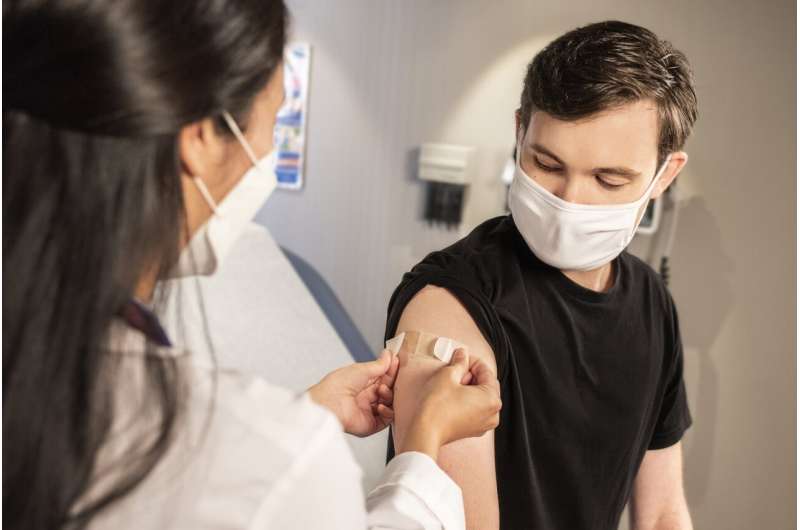Credit: Unsplash/CC0 Public Domain
In a Brief Communication, published July 29, 2021 in the journal Transplant Infectious Disease, a team of physician-scientists at University of California San Diego School of Medicine found that solid organ transplant recipients who were vaccinated experienced an almost 80 percent reduction in the incidence of symptomatic COVID-19 compared to unvaccinated counterparts during the same time.
"Persons who have received an organ transplant are considered to be at increased risk for COVID-19 and for a severe outcome because their immune systems are necessarily suppressed to ensure their transplants are successful and lasting," said Saima Aslam, MD, professor of medicine at UC San Diego School of Medicine and medical director of the Solid Organ Transplant Infectious Disease Service at UC San Diego Health. "These findings offer strong evidence that getting vaccinated provides significant protection."
The researchers examined clinical data from the UC San Diego Health transplant registry from January 1, 2021 through June 2, 2021, encompassing 2,151 solid organ transplant recipients, including kidney, liver, lung and heart. Of this total number, 912 patients were fully vaccinated and 1,239 were controls (1,151 were unvaccinated and 88 partially vaccinated). Nearly 70 percent of the vaccinated patients received the mRNA-1273 vaccine (Moderna).
During the study period, there were 65 diagnosed cases of COVID-19 among the organ recipients: Four among fully vaccinated individuals and 61 among the controls (two involving partially vaccinated individuals). There were no deaths among the breakthrough COVID-19 cases, but two among the 61 control cases.
"These findings are encouraging for a couple of reasons," said co-author Kristin Mekeel, MD, chief of Transplant and Hepatobiliary Surgery at UC San Diego Health. "First, it demonstrates real world clinical effectiveness of COVID-19 vaccination in a vulnerable population. Second, the effectiveness is better than expected, given that studies have found that only about half of solid organ transplant recipients develop detectable anti-spike antibodies after vaccination."
Aslam said the results underscore the importance for transplant patients to get vaccinated against COVID-19 and to not focus on antibody levels alone. "However, vaccine protection is not perfect and so it's important to continue to mask and socially isolate as well, and to encourage household members to get vaccinated, especially given the current COVID-19 surge in San Diego."
The authors noted several limitations of the study: It involved retrospective data collection, was a single center report and there was potential for under-reporting by some patients of their vaccination status. They also noted that almost half of the study population was not vaccinated during the study period, underscoring the need for improved outreach to the transplant community regarding the benefits of COVID-19 vaccination.
More information: Saima Aslam et al, Clinical effectiveness of COVID‐19 vaccination in solid organ transplant recipients, Transplant Infectious Disease (2021). DOI: 10.1111/tid.13705
Provided by University of California - San Diego
























